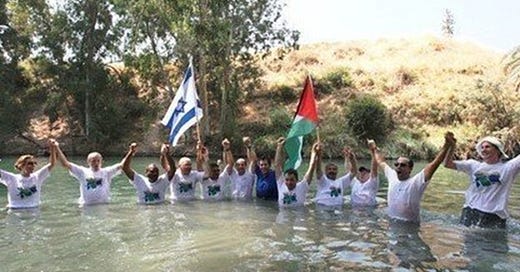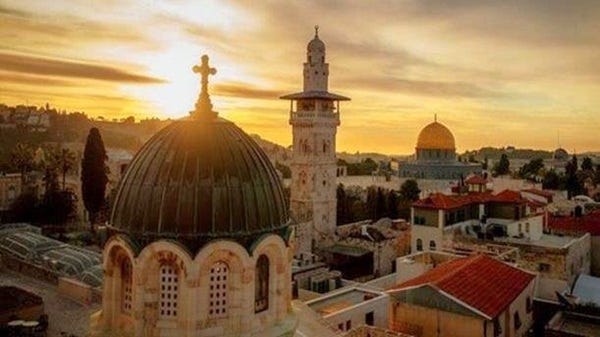The conflict between Palestinians and Israelis has now become a Gordian Knot. It seems impossible to untie it. As violence, counter-violence and revenge continue and the conflict merges with other conflicts in the region, the knot is becoming increasingly tangled and tighter. Do we really need a sword to untie it? And whose sword should it be? What else will be destroyed in the process? How many more people will have to suffer and die as a result?
A dialogue between a Palestinian from Ramallah and an Israeli-Dutch citizen took place on the fringes of this year's Ventotene Seminar. It shows that we must not give up hope for peaceful coexistence between Palestinians and Israelis. An article about the dialogue was published on eurobull.it: An Israeli-Palestinian Dialogue in Ventotene. I take this article as an opportunity to take a somewhat older action from the archive. A few years ago, I started the petition ‘Make Jerusalem the Capital of Peace!’ on Change.org. It received little attention and was cancelled. Perhaps it was too idealistic. Nevertheless, I want to present it here because I believe it would be a model for lasting peace in the Middle East. It is about the vision of a Middle East Federation, a three-state solution involving Israel, Palestine and the Kingdom of Jordan, known as the Jordan Union for short. Jordan seems important here because the Jordanian Royal Family is strongly committed to interfaith dialogue and peace.
Make Jerusalem the Capital of Peace!
In a democratic world federation, problems such as the Middle East conflict could be overcome quickly and would not arise in the first place. But let's try it a few sizes smaller first. In my opinion, what is missing in the Middle East is a stable core region of peace. We achieved something like this in Europe after the Second World War with the Franco-German reconciliation, where old hereditary enemies came to their senses. Why shouldn't this also be possible in the Levant? The key to this could be the project of a federation of Israel, Palestine and Jordan, which could be collectively referred to as the ‘Jordan Union’. Not because of Jordan's involvement, but named after the river Jordan, which has a special significance for all religious communities in the centre of the region.
The prospect of a Middle East alliance is not new. It has been raised repeatedly in the past, for example by the liberal philosopher of religion and culture Martin Buber. ‘As a result of the historical events of the 1930s and 1940s in Europe, above all the rise to power of the National Socialists, which led to Auschwitz and thus to the murder of six million Jews, Buber finally accepted the reality of the state of Israel proclaimed on 14 May 1948. Instead of a binational Palestine, he favoured the idea of a Middle East federation with an internationalised Jerusalem.’ (Wikipedia)
However, such peace initiatives failed time and again due to the unreasonableness of the majority of those involved. It is worth recalling the words of Yitzchak Rabin, shortly before his violent death: ‘I would like to thank each and every one of you who has come here today to demonstrate in favour of peace and against violence. This government, which I have the privilege of heading together with my friend Shimon Peres, has decided to give peace a chance - a peace that will solve most of Israel's problems. ... The path of peace is preferable to the path of war. I tell you this as someone who was a military man for 27 years.’ (Wikipedia)
So we continue to face the mountain of problems, with the gloomy prospect that the violence in the Middle East will not stop until everyone has killed each other. It is time to develop visions of peace again, even if they are perhaps ridiculed as unrealistic. What would be wrong with a 'Jordan Union', which other states in the region could then join over time, with Jerusalem as the common capital of peace? There was a similar petition on Chance.org at the time: Jerusalem as an example for a better world!
I would also like to draw your attention to an article by Rene Wadlow, President of the Association of World Citizens, which deals with the possibility of a Conference on Security and Cooperation in the Middle East along the lines of the Helsinki process. That would be an even more comprehensive multi-state solution. Actually, this part of the world could be something of a paradise if only people were sensible. In light of the current developments in Syria and the associated geopolitical consequences, it certainly seems naive to think about utopias such as a Middle East federation. But perhaps peaceful alternatives should be discussed all the more now.





